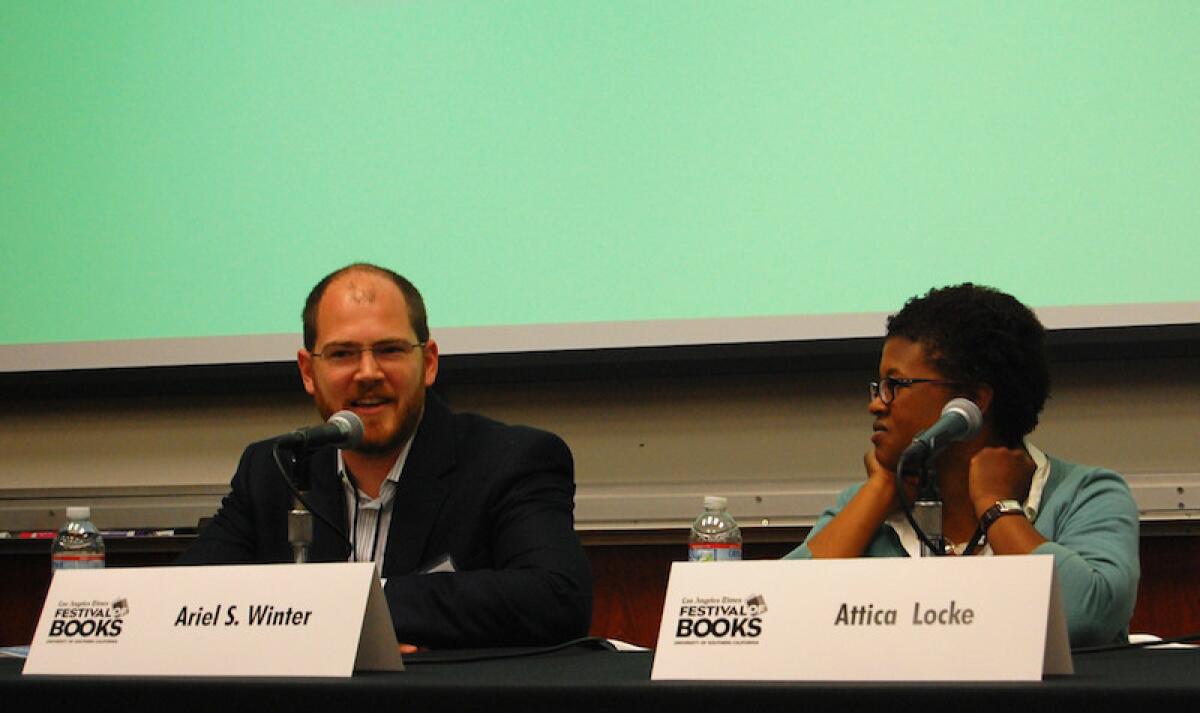Crime fiction authors discuss pushing the genre’s boundaries

- Share via
In “The Simple Art of Murder,” Raymond Chandler wrote that the world inhabited by good crime fiction “is not a fragrant world, but it is the world you live in, and certain writers with tough minds and a cool spirit of detachment can make very interesting and even amusing patterns out of it.”
During a conversation tantalizingly titled “What We Can’t Tell You” on Saturday, four such authors pulled back the curtain on how they craft compelling mysteries. In doing so, they also demonstrated the breadth and depth of the genre.
For Attica Locke, crime fiction is a means to confront the ghosts of the past and the politics of the present. Her latest book, “The Cutting Season,” was inspired by a trip to a plantation in Louisiana that has been turned into a historical tourism site.
FULL COVERAGE: FESTIVAL OF BOOKS
“I wanted to tell a story on a plantation that held the past and the present at the same time and kind of ask the question of, in the face of tremendous progress, what do we do with this history? Do we turn these places into events venues, have parties there, or is that not the best way to preserve our history? And so the book was to explore all that — with a dead body.”
She added, “I think of crime fiction as being inherently political. And what I mean by that is that it’s inherently looking at distribution of power. What I love about crime fiction, and what I love about it as a writer and a reader, is that you’re able to take these kind of high-minded ideals and put them on the street.”
In writing “The Twenty-Year Death,” a trio of linked stories written in the styles of three different master crime novelists, author Ariel S. Winter asked himself, “What’s a different way to approach a mystery series?”
VIDEO: AUTHOR INTERVIEWS FROM FESTIVAL OF BOOKS
“I thought, well, instead of having the detective be the same from book to book, which is how most mystery series work, what would happen if one of the other characters was the same from book to book?”
That character is a struggling writer with shades of F. Scott Fitzgerald. Writing his story complemented another of Winter’s goals, which was to underline the kinship between classic hard-boiled crime fiction and modernist literature.
“What I was trying to achieve was in a lot of ways paying homage to crime writers while also trying to … bring in some of the existential concerns that concerned Faulkner, Fitzgerald and Hemingway,” he said.
Fuminori Nakamura, author of “The Thief,” similarly blurs genre boundaries with his work, which has earned comparisons to Dostoevsky, Mishima and Camus.
“I’m often asked whether my works belong to the category of pure literature or crime novels,” Nakamura said through a translator. “I’m actually fine with people categorizing my works in any genre they please.”
Chris Pavone, author of “The Expats,” confessed, “I don’t really read crime fiction. It’s not that I dislike it, but it’s not my favorite type of book to read, and I’ve never really consumed a lot of it.”
He’s less interested in creating clever plot puzzles, he said, than interesting characters. “Constructing characters — sympathetic and not sympathetic, nice and not nice — is what fiction really is.”
Of “The Expats,” he said, “This is sort of the opposite of what I think a lot of certainly the best-selling crime fiction is, which is you know exactly what’s going to happen — it’s just a question of, in the end, being satisfied with your own cleverness as a reader that you guessed it first. I just don’t dig that.”
More to Read
Sign up for our Book Club newsletter
Get the latest news, events and more from the Los Angeles Times Book Club, and help us get L.A. reading and talking.
You may occasionally receive promotional content from the Los Angeles Times.










